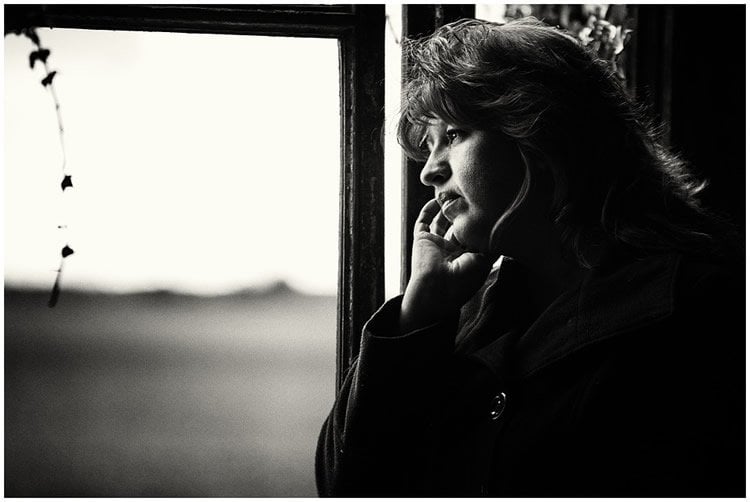Summary: A new study reports women who have experienced sexual violence have more vivid memories than women coping with other traumatic experiences. Sexual violence survivors, researchers report, have more intense memories decades after the attack has occurred, which are difficult for them to forget.
Source: Rutgers University.
Women who are sexually assaulted experience more vivid memories than women coping with the aftermath of other traumatic, life-altering events not associated with sexual violence, according to a new Rutgers-New Brunswick study.
The research, published in Frontiers in Neuroscience, found that women who had suffered from sexual violence, even those who were not diagnosed with Post-Traumatic Stress Disorder, had more intense memories – even decades after the violence occurred – that are difficult, if not impossible to forget.
“To some extent it is not surprising that these memories relate to more feelings of depression and anxiety because these women remember what happened and think about it a lot,” said Tracey Shors, professor in the Department of Psychology and Center for Collaborative Neuroscience in the School of Arts and Sciences who co-authored the study. “But these feelings and thoughts are usually associated with PTSD and most women in our study who experienced these vivid memories did not suffer from PTSD, which is generally associated with more intense mental and physical reactions.”
The study included 183 college-aged women between the ages of 18-39. Sixty-four women reported that they were victims of sexual violence while 119 did not have a history of sexual violence. Less than 10 percent were on anti-anxiety or antidepressant medication.
The women with a history of sexual violence reported stronger memories with specific details that included seeing the event clearly in their mind. They reported having a harder time forgetting the incident and believed it to be a significant part of their life story, according to the research.
“Each time you reflect on an old memory, you make a new one in your brain because it is retrieved in the present space and time,” said Shors. “What this study shows is that this process can make it even more difficult to forget what happened.”
Studies have shown that sexual aggression and violence is one of the most likely causes of PTSD in women, a condition that is associated with decreased brain functions related to learning and memory that can be both physically and mentally debilitating and difficult to overcome.
“Women in our study who ruminated more frequently also reported more trauma-related symptoms. One could imagine how rumination could exacerbate trauma symptoms and make recovery from the trauma more difficult,” said Emma Millon, a Rutgers graduate student and co-author of the research.

According to the World Health Organization, 30-percent of women worldwide experience some kind of physical or sexual assault in their lifetime with adolescent girls much more likely to be the victims of rape, attempted rape or assault. Recent surveys indicate that as many as one in five college students experience sexual violence during their university years.
Shors has developed a new treatment to lessen these vivid memories and help women recover that is different from the traditional Prolonged Exposure Therapy, which includes recollecting the traumatic memory during interviews, story writing and even revisiting the traumatic location.
Mental and Physical Training (MAP Training) developed by Shors combines 30 minutes of mental training with silent meditation followed by 30 minutes of aerobic exercise, twice a week for six weeks. In previous studies, MAP Training diminished trauma symptoms in women who experienced violence, with those participating reporting significantly fewer trauma-related thoughts and ruminations about the past.
“This problem will not go away soon and we must keep our attention focused on prevention and justice for survivors – and their recovery,” Shors said.
Source: Robin Lally – Rutgers University
Publisher: Organized by NeuroscienceNews.com.
Image Source: NeuroscienceNews.com image is in the public domain.
Original Research: Open access research for “Stressful Life Memories Relate to Ruminative Thoughts in Women With Sexual Violence History, Irrespective of PTSD” by Emma M. Millon, Han Yan M. Chang and Tracey J. Shors in Frontiers in Neuroscience. Published September 5 2018.
doi:10.3389/fpsyt.2018.00311
[cbtabs][cbtab title=”MLA”]Rutgers University”Sexual Violence Haunts Women with Vivid Memories Decade Later.” NeuroscienceNews. NeuroscienceNews, 5 September 2018.
<https://neurosciencenews.com/sexual-violence-ptsd-9805/>.[/cbtab][cbtab title=”APA”]Rutgers University(2018, September 5). Sexual Violence Haunts Women with Vivid Memories Decade Later. NeuroscienceNews. Retrieved September 5 2018 from https://neurosciencenews.com/sexual-violence-ptsd-9805/[/cbtab][cbtab title=”Chicago”]Rutgers University”Sexual Violence Haunts Women with Vivid Memories Decade Later.” https://neurosciencenews.com/sexual-violence-ptsd-9805/ (accessed September 5 2018).[/cbtab][/cbtabs]
Abstract
Stressful Life Memories Relate to Ruminative Thoughts in Women With Sexual Violence History, Irrespective of PTSD
More than one in every four women in the world experience sexual violence (SV) in their lifetime, most often as teenagers and young adults. These traumatic experiences leave memories in the brain, which are difficult if not impossible to forget. We asked whether women with SV history experience stronger memories of their most stressful life event than women without SV history and if so, whether strength relates to ruminative and trauma-related thoughts. Using the Autobiographical Memory Questionnaire (AMQ), women with SV history (n = 64) reported this memory as especially strong (p < 0.001), remembering more sensory and contextual details, compared to women without SV history (n = 119). They further considered the event a significant part of their personal life story. The strength of the memory was highly correlated with posttraumatic cognitions and ruminative thoughts, as well as symptoms of depression and anxiety (p's < 0.001, n = 183). A third (33%) of the women with SV history were diagnosed with posttraumatic stress disorder (PTSD), but PTSD alone did not account for the increase in memory strength (p's < 0.001). These data suggest that the experience of SV increases the strength of stressful autobiographical memories, which are then reexperienced in everyday life during posttraumatic and ruminative thoughts. We propose that the repeated rehearsal of vivid stressful life memories generates more trauma memories in the brain, making the experience of SV even more difficult to forget.






